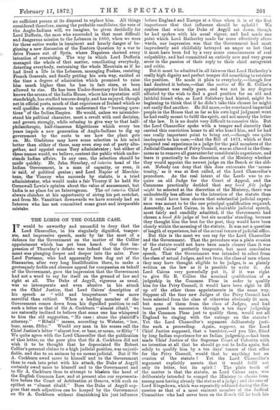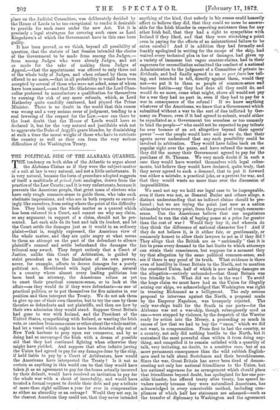THE LORDS ON THE COLLIER CASE.
TT would be unworthy and uncandid to deny that the 1. Lord Chancellor, in his singularly dignified, temper- ate, and impressive speech, made by far the most of a defence for the Government on the matter of the Collier appointment which has yet been heard. Oar first im- pression of Thursday's debate was indeed that the Govern- ment was plunging deeper and deeper into the mire. Poor Lord Portman, who had apparently been dug out of the Stannaries, after very long fossilification there, to make a grotesquely feeble and obscure appeal for compassion on behalf of the Government, gave the impression that the Government had not a word to say for itself on the ground of law and right at all. The Duke of Argyll, vigorous as usual, was so intemperate and even abusive in his attack on the Chief Justice, that Lord Cairns' description of his speech as " wild and tempestuous " was more merciful than critical. When a leading member of the Government comes down from his dignified position to call such a letter as that of Sir A. Cockburn " almost ribald," we are naturally inclined to believe that some one has whispered to him the old suggestion, " No case ; abuse the plaintiff's attorney." " Ribald " means, according to Webster, " low, base, mean, filthy." Would any man in his senses call the Chief Justice's letter " almost low, or base, or mean, or filthy "? We quite agree with the Lord Chancellor that the publication of that letter, on the poor plea that Sir A. Cockburn did not wish it to be thought that he depreciated Sir Robert Collier's personal claims to a high judicial position, was unjusti- fiable, and due to an animus by no means judicial. But if Sir A. Cockburn owed more to himself and to the Government than to rush into print with his attack, the Duke of Argyll certainly owed more to himself and to the Government and to Sir A. Cockburn than to attempt to blasken the head of the English Common Law, and at present also our representa- tive before the Court of Arbitration at Geneva, with such an epithet as " almost ribald." Does the Duke of Argyll sup- pose that such adjectives can be heaped by the Government on Sir A. Cockburn without diminishing his just influence before England and Europe at a time when it is of the first importance that that influence should be upheld ? We confess that when the Duke of Argyll sat down, though he had spoken with his usual vigour, and had made one point which Lord Hatherley made far more effectively after- wards, our impression was that the Government had most imprudently and childishly betrayed an anger so hot that it must have been fed by a very acute consciousness of real culpability, and had committed an entirely new and very gross error in the passion of their reply to their chief antagonist and critic.
But it must be admitted in all fairness that Lord Hatherley's really high dignity and perfect temper did something to retrieve the position. He made it plain to everybody,—though few had doubted it before,—that the motive of Sir R. Collier's appointment was really pure, and was not in any degree affected by the wish to find a good position for an old and faithful friend who, as Lord Salisbury had hinted, might be beginning to think that if he didn't take this chance he might not easily find another. He did more,—he convinced impartial people in the House that as far as his own legal judgment went he had really meant to fulfil the spirit, and not merely the letter of the law. It is no doubt very difficult to conceive this. But the Lord Chancellor spoke with a temper and sincerity that carried this conviction home to all who heard him, and he had one really important point to bring out,—though one quite inadequate to his case,—that the Bill of 1871, which at first required real experience in a judge for the paid members of the Judicial Committee of Privy Council, was so altered in the Com- mons as to remove all guarantee for considerable experience, and leave it practically to the discretion of the Ministry whether they would appoint the newest judge on the Bench or the old- est. Nobody can deny that this does extenuate the 'mons- trosity,' as it was at first called, of the Lord Chancellor's procedure. As the real intent of the Lords was to re- quire an old Judge for the Court of Appeal, and the Commons practically decided that any bond fide judge might be selected at the discretion of the Ministry, there was undoubtedly less affront to the intention of the statute than if it could have been shown that substantial judicial experi- ence was meant to be the one principal qualification required. Assuredly, as Lord Cairns, in his admirable judicial speech, most fairly and candidly admitted, if the Government had chosen a bond fide judge of but six months' standing, because they thought him the best for the post, they would have been clearly within the meaning of the statute. It was not a question of length of experience, but of the actual tenure of judicial office.
But this is the most we can say for the Lord Chancellor and the Government. That the procedure was a plain evasion of the statute could not have been made clearer than it was by Lord Cairns' perfectly temperate, but most conclusive speech, That the Government was intended to select from the class of actual Judges, and not from the class of men whom they may have thought eligible to be judges, is as plainly written on the law as it is possible to write it. As Lord Cairns very powerfully put it, if it was right to give Sir R. Collier the nominal qualification of a judgeship in the Common Pleas in order to qualify him for the Privy Council, it would have been right to fill up all the other three appointments in the same way. Suppose all the four new Judges of the Privy Council had been selected from the class of otherwise obviously fit men, but none of them from the class of Judges, and had been passed in succession through a ten days' judgeship in the Common Pleas just to qualify them, would not all
England be ringing with the outrage on the statute ? Yet the Lord Chancellor's argument deliberately justi- fies such a proceeding. Again, suppose, as the Lord Chief Justice supposed, that a barrister,—if you like, fitted by long Indian experience for an Indian judgeship,--had been made Chief Justice of the Supreme Court of Calcutta with no intention at all that he should go out to India again, but solely to qualify him by a ten days' tenure of that office for the Privy Council, would that be anything but an evasion of the statute ? Yet the Lord Chancellor's argument explicitly asserts that it would fulfil not only its letter, but its spirit ! The plain truth of the matter is that the statute, as Lord Cairns says, was deliberately intended to compel the Ministry to choose from among men having already the status of a judge ; and the case of Lord Kingadown, which was repeatedly adduced during the dis- cussion as that of a most eminent member of the Judical Committee who had never been on the Bench till he took his place on the Judicial Committee, was deliberately decided by the House of Lords to be too exceptional to render it desirable to provide for such cases under the new Act. Yet it is precisely a legal stratagem for covering such cases as Lord Kingsdown's of which the Government have in this case been guilty. It has been proved, as we think, beyond all possibility of question, that the statute of last Session intended the choice of the Government to be made from among the Judges,— from among Judges who were already Judges, and not so made for the sake of making them Judges of Appeal,—that the appointment was offered to only three out of the whole body of Judges, and when refused by them was offered to no more,—that in all probability it would have been accepted by several of those who were not asked, some of whom have been named,—and that Mr. Gladstone and the Lord Chan- cellor preferred to manufacture a qualification for themselves to running the risk of any more refusals, which, as Lord Batherley quite candidly confessed, had piqued the Prime Minister. There is no doubt in the world that this course was wrong and a very serious error of judgment, tending to a real lowering of the respect for the Law,—nor can there be the least doubt that the House of Lords would have so declared it, but for the very natural and justifiable wish not to aggravate the Duke of Argyll's grave blunder, by diminishing at such a time the moral weight of those who have to extricate the country as well as they can from the very serious difficulties of the Washington Treaty.



































 Previous page
Previous page